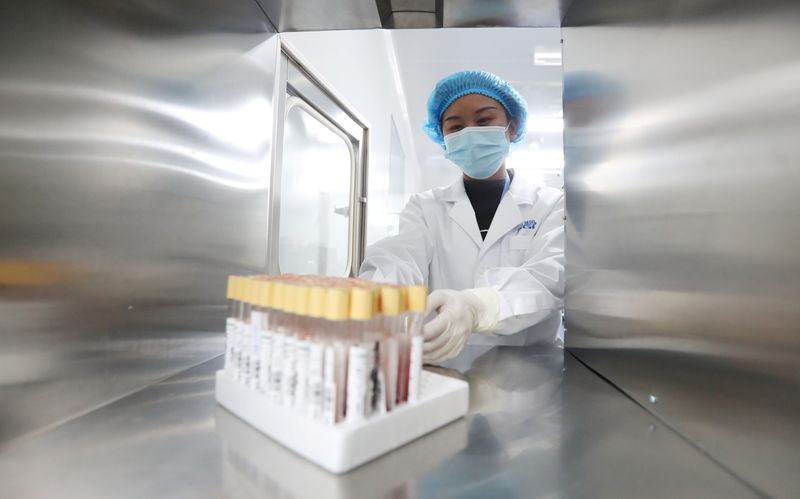By Kirsty Needham
SYDNEY (Reuters) - Australia says its purchase of 10 million coronavirus test kits from Chinese genomics company BGI will not risk patient privacy, as researchers hope for greater price competition in a biotech market dominated by a U.S rival.
The deal was struck even as relations between Australia and China have been strained by Australia's call for a global enquiry into the coronavirus outbreak, which China has framed as a U.S.-led attempt to blame it for the pandemic.
BGI – Beijing Genomics Institute - has grown into one of the world's largest genomics companies in the two decades since it worked on the Human Genome Project. It has one lab in Australia and had been seeking to expand its genome sequencing services.
BGI, whose BGI Genomics Co (SZ:300676) is listed on the Shenzhen stock exchange, was named as having "evident links" to the Chinese government in a U.S. Trade Office report into Chinese technology transfer practices that was used to justify the U.S. imposition of tariffs on Chinese exports.
There are also concerns about its work in China, including providing gene technology used for surveillance of the Uighur ethnic minority in China's western Xinjiang region.
BGI is also defending multiple patent lawsuits from U.S. firm Illumina Inc (O:ILMN), the dominant player in the Australian market.
But unlike the Australian government's move to effectively exclude Chinese telecom giant Huawei from its 5G network on national security grounds because of its perceived links to Beijing, security agencies have approved the mass use of BGI technology to combat the novel coronavirus.
Australian pathology companies have installed BGI's nucleic acid extraction machines in 11 laboratories, to process the tests automatically, BGI said in a statement.
A spokesman for Australian health minister Greg Hunt said privacy laws covered pathology tests and patient data, and the use of BGI equipment had been approved by security agencies.
"BGI will have no access to patient information as they will not be operating the labs," the spokesman said in a statement, with pathology companies required to comply with security agency advice on installing BGI's technology.
"The extent of BGI's involvement with existing Australian laboratories will be limited to the installation of COVID-19 pathology testing platforms and training of staff."
'COMPLEX COMPANY'
Asked about privacy concerns, BGI Australia Director Bicheng Yang said Australian pathology labs would operate under national guidelines.
"BGI provided technology transfer and the equipment does not collect personal data. The process tests the viral RNA (ribonucleic acid) only, if it is present," Yang said in a statement to Reuters.
The technology used to test for the coronavirus is different from those used in the diagnosis of other rare diseases, cancer and birth defects in pregnancy, but the scale of the coronavirus programme will boost BGI's links with Australian laboratories, Australian researchers who work with BGI said.
Marcel Dinger, president of the Australian Genomics Technologies Association and a director of Pryzm Health, a data science company that develops rare disease diagnosis software, said most gene sequencing in Australia was supplied by Illumina.
"They have the lion's share by a long way in the market when it comes to genome sequencing. BGI have a fairly equivalent technology now ... They are really a competitor in the market with real potential to disrupt," he said.
BGI wants to bring the cost of sequencing a patient's whole genome down to a few hundred dollars, Dinger said.
"It would make genome sequencing more widely available".
BGI owns the China National Genebank, containing 11 million human, plant and animal DNA samples.
Australia does not have a national genome database because privacy concerns have stopped its development, Dinger said.
La Trobe University associate professor James Leibold said there were "larger ethical issues" associated with BGI, including data privacy, its use of the world's largest gene database, and providing gene technology for surveillance of the Uighurs in Xinjiang.
"They are a complex company that operates under a different ethical framework," Leibold, who is an expert in Uighur studies and is critical of the Australian health agency's decision to work with BGI, told Reuters.
